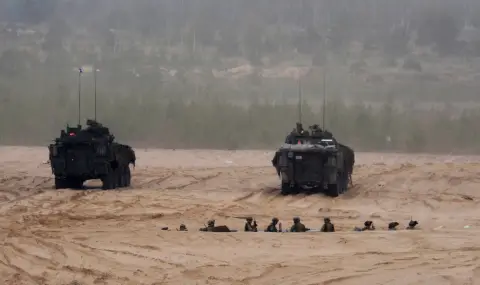In Estonia, near the Russian border, NATO conducts an exercise to repel a mock attack in order to dissuade Moscow from any attempts to cross the borders of the Alliance, reports AFP, News.bg reports.
The exercise, codenamed "Picne", involves about 1,800 troops, including 700 French, as well as sailors and airmen, and will last until December 15. Its purpose is to test the Allies' ability to react quickly, to "buy time" for the mobilization of Estonia's reservists and for sending reinforcements from NATO.
"This is an unclassified version of our real military plan," explained General Indrek Syrel, head of the Estonian army. He said the exercise, originally created by Estonian and French officers and approved by NATO, demonstrated the Alliance's resolve. It also tests Estonia's ability to mobilize 30,000 reservists – the main fighting force of the army, which has 7,000 active soldiers.
NATO to strengthen its deterrence posture, since 2016. maintains a multinational battalion in Estonia under British command, in which France also participates.
As part of "Picnet", France activated a special unit for increased readiness. Within 24 hours, 200 paratroopers from the southern French city of Carcassonne were transported to Estonia by A400M military transport aircraft and immediately involved in the simulated conflict.
At sea, two French and one Estonian ship are patrolling the Gulf of Finland to prevent amphibious operations in NATO's rear area. Air defenses are bolstered by Dutch F-35s and French Rafales deployed to guard Baltic airspace.
General Pierre Schille, Chief of the General Staff of the French Army, emphasized that the exercise was a demonstration of will and operational capabilities. "Units that have never trained together in France plug into an existing command network using common radio frequencies and maps. This shows our resolve and contributes to Russia's deterrence," he said.
At a time when Russia is threatening allies over their support for Ukraine, "Pikne" aims to send a clear strategic message to Moscow. "We are active, ready and interoperable in any environment,", emphasized General Bruno Helui, Deputy Chief of Staff of the NATO Command in Brunssum, Netherlands.
"The Russians have seen what is a significant success," added General Schill, commenting on the effectiveness of the exercise.
